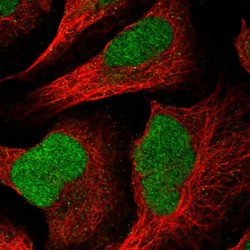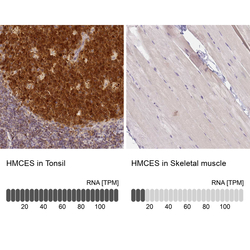Antibody data
- Antibody Data
- Antigen structure
- References [6]
- Comments [0]
- Validations
- Western blot [1]
- Immunocytochemistry [1]
- Immunohistochemistry [1]
Submit
Validation data
Reference
Comment
Report error
- Product number
- HPA044968 - Provider product page

- Provider
- Atlas Antibodies
- Proper citation
- Atlas Antibodies Cat#HPA044968, RRID:AB_2679160
- Product name
- Anti-HMCES
- Antibody type
- Polyclonal
- Description
- Polyclonal Antibody against Human HMCES, Gene description: 5-hydroxymethylcytosine (hmC) binding, ES cell-specific, Alternative Gene Names: C3orf37, DC12, SRAPD1, Validated applications: ICC, IHC, WB, Uniprot ID: Q96FZ2, Storage: Store at +4°C for short term storage. Long time storage is recommended at -20°C.
- Reactivity
- Human
- Host
- Rabbit
- Conjugate
- Unconjugated
- Isotype
- IgG
- Vial size
- 100 µl
- Concentration
- 0.2 mg/ml
- Storage
- Store at +4°C for short term storage. Long time storage is recommended at -20°C.
- Handling
- The antibody solution should be gently mixed before use.
Submitted references Novel mechanisms for the removal of strong replication-blocking HMCES- and thiazolidine-DNA adducts in humans.
HMCES protects immunoglobulin genes specifically from deletions during somatic hypermutation
Loss of the abasic site sensor HMCES is synthetic lethal with the activity of the APOBEC3A cytosine deaminase in cancer cells.
HMCES Maintains Replication Fork Progression and Prevents Double-Strand Breaks in Response to APOBEC Deamination and Abasic Site Formation
HMCES safeguards replication from oxidative stress and ensures error‐free repair
HMCES Maintains Genome Integrity by Shielding Abasic Sites in Single-Strand DNA
Sugimoto Y, Masuda Y, Iwai S, Miyake Y, Kanao R, Masutani C
Nucleic acids research 2023 Jun 9;51(10):4959-4981
Nucleic acids research 2023 Jun 9;51(10):4959-4981
HMCES protects immunoglobulin genes specifically from deletions during somatic hypermutation
Wu L, Shukla V, Yadavalli A, Dinesh R, Xu D, Rao A, Schatz D
Genes & Development 2022;36(7-8):433-450
Genes & Development 2022;36(7-8):433-450
Loss of the abasic site sensor HMCES is synthetic lethal with the activity of the APOBEC3A cytosine deaminase in cancer cells.
Biayna J, Garcia-Cao I, Álvarez MM, Salvadores M, Espinosa-Carrasco J, McCullough M, Supek F, Stracker TH
PLoS biology 2021 Mar;19(3):e3001176
PLoS biology 2021 Mar;19(3):e3001176
HMCES Maintains Replication Fork Progression and Prevents Double-Strand Breaks in Response to APOBEC Deamination and Abasic Site Formation
Mehta K, Lovejoy C, Zhao R, Heintzman D, Cortez D
Cell Reports 2020;31(9):107705
Cell Reports 2020;31(9):107705
HMCES safeguards replication from oxidative stress and ensures error‐free repair
Srivastava M, Su D, Zhang H, Chen Z, Tang M, Nie L, Chen J
EMBO reports 2020;21(6)
EMBO reports 2020;21(6)
HMCES Maintains Genome Integrity by Shielding Abasic Sites in Single-Strand DNA
Mohni K, Wessel S, Zhao R, Wojciechowski A, Luzwick J, Layden H, Eichman B, Thompson P, Mehta K, Cortez D
Cell 2019;176(1-2):144-153.e13
Cell 2019;176(1-2):144-153.e13
No comments: Submit comment
Enhanced validation
- Submitted by
- Atlas Antibodies (provider)
- Enhanced method
- Genetic validation
- Main image

- Experimental details
- Western blot analysis in MCF-7 cells transfected with control siRNA, target specific siRNA probe #1 and #2, using Anti-HMCES antibody. Remaining relative intensity is presented. Loading control: Anti-GAPDH.
- Sample type
- Human
- Protocol
- Protocol
Supportive validation
- Submitted by
- Atlas Antibodies (provider)
- Main image

- Experimental details
- Immunofluorescent staining of human cell line U-2 OS shows localization to nucleus.
- Sample type
- Human
Supportive validation
- Submitted by
- Atlas Antibodies (provider)
- Enhanced method
- Orthogonal validation
- Main image

- Experimental details
- Immunohistochemistry analysis in human tonsil and skeletal muscle tissues using HPA044968 antibody. Corresponding HMCES RNA-seq data are presented for the same tissues.
- Sample type
- Human
- Protocol
- Protocol
 Explore
Explore Validate
Validate Learn
Learn Western blot
Western blot Immunocytochemistry
Immunocytochemistry